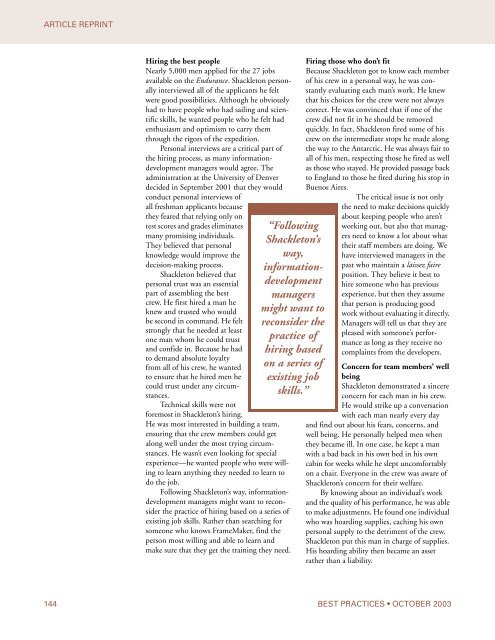October - Center for Information-Development Management
October - Center for Information-Development Management
October - Center for Information-Development Management
Create successful ePaper yourself
Turn your PDF publications into a flip-book with our unique Google optimized e-Paper software.
ARTICLE REPRINTHiring the best peopleNearly 5,000 men applied <strong>for</strong> the 27 jobsavailable on the Endurance. Shackleton personallyinterviewed all of the applicants he feltwere good possibilities. Although he obviouslyhad to have people who had sailing and scientificskills, he wanted people who he felt hadenthusiasm and optimism to carry themthrough the rigors of the expedition.Personal interviews are a critical part ofthe hiring process, as many in<strong>for</strong>mationdevelopmentmanagers would agree. Theadministration at the University of Denverdecided in September 2001 that they wouldconduct personal interviews ofall freshman applicants becausethey feared that relying only ontest scores and grades eliminatesmany promising individuals.They believed that personalknowledge would improve thedecision-making process.Shackleton believed thatpersonal trust was an essentialpart of assembling the bestcrew. He first hired a man heknew and trusted who wouldbe second in command. He feltstrongly that he needed at leastone man whom he could trustand confide in. Because he hadto demand absolute loyaltyfrom all of his crew, he wantedto ensure that he hired men hecould trust under any circumstances.Technical skills were not<strong>for</strong>emost in Shackleton’s hiring.He was most interested in building a team,ensuring that the crew members could getalong well under the most trying circumstances.He wasn’t even looking <strong>for</strong> specialexperience—he wanted people who were willingto learn anything they needed to learn todo the job.Following Shackleton’s way, in<strong>for</strong>mationdevelopmentmanagers might want to reconsiderthe practice of hiring based on a series ofexisting job skills. Rather than searching <strong>for</strong>someone who knows FrameMaker, find theperson most willing and able to learn andmake sure that they get the training they need.“FollowingShackleton’sway,in<strong>for</strong>mationdevelopmentmanagersmight want toreconsider thepractice ofhiring basedon a series ofexisting jobskills.”Firing those who don’t fitBecause Shackleton got to know each memberof his crew in a personal way, he was constantlyevaluating each man’s work. He knewthat his choices <strong>for</strong> the crew were not alwayscorrect. He was convinced that if one of thecrew did not fit in he should be removedquickly. In fact, Shackleton fired some of hiscrew on the intermediate stops he made alongthe way to the Antarctic. He was always fair toall of his men, respecting those he fired as wellas those who stayed. He provided passage backto England to those he fired during his stop inBuenos Aires.The critical issue is not onlythe need to make decisions quicklyabout keeping people who aren’tworking out, but also that managersneed to know a lot about whattheir staff members are doing. Wehave interviewed managers in thepast who maintain a laissez faireposition. They believe it best tohire someone who has previousexperience, but then they assumethat person is producing goodwork without evaluating it directly.Managers will tell us that they arepleased with someone’s per<strong>for</strong>manceas long as they receive nocomplaints from the developers.Concern <strong>for</strong> team members’ wellbeingShackleton demonstrated a sincereconcern <strong>for</strong> each man in his crew.He would strike up a conversationwith each man nearly every dayand find out about his fears, concerns, andwell being. He personally helped men whenthey became ill. In one case, he kept a manwith a bad back in his own bed in his owncabin <strong>for</strong> weeks while he slept uncom<strong>for</strong>tablyon a chair. Everyone in the crew was aware ofShackleton’s concern <strong>for</strong> their welfare.By knowing about an individual’s workand the quality of his per<strong>for</strong>mance, he was ableto make adjustments. He found one individualwho was hoarding supplies, caching his ownpersonal supply to the detriment of the crew.Shackleton put this man in charge of supplies.His hoarding ability then became an assetrather than a liability.144 BEST PRACTICES • OCTOBER 2003





